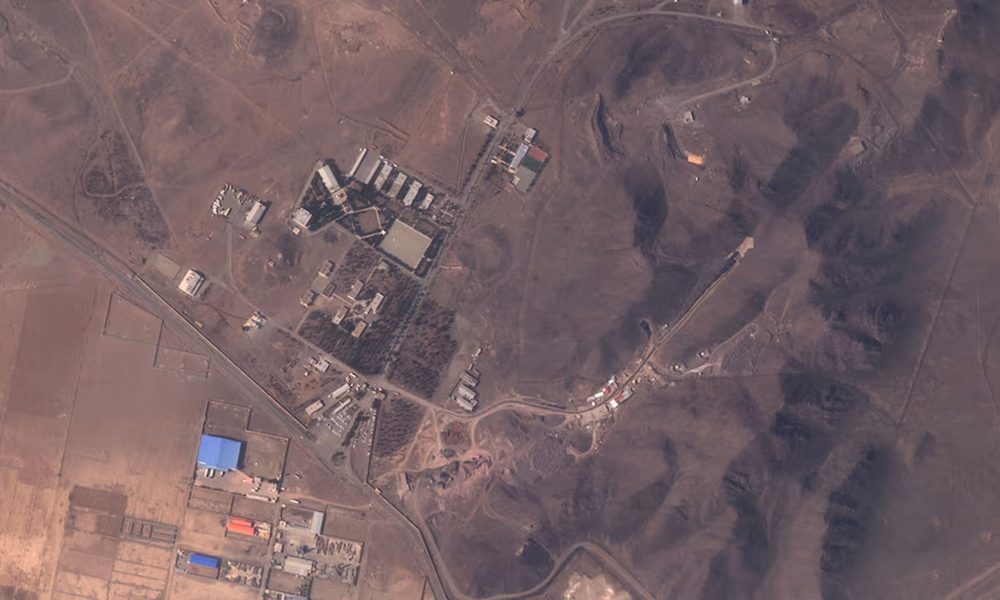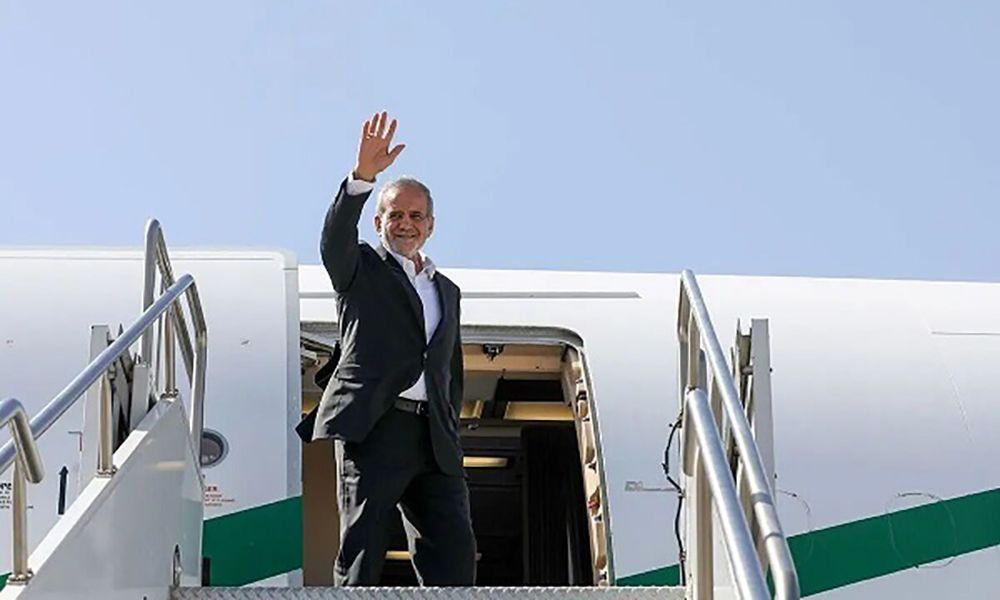Regional
Satellite photos show Iran expanding missile production
Three Iranian officials, who asked not to be identified because they were not authorized to speak publicly, confirmed that Modarres and Khojir are being expanded to boost production of conventional ballistic missiles.

Recent satellite imagery shows major expansions at two key Iranian ballistic missile facilities that two American researchers assessed are for boosting missile production, a conclusion confirmed by three senior Iranian officials.
The enlargement of the sites follows an October 2022 deal in which Iran agreed to provide missiles to Russia, which has been seeking them for its war against Ukraine. Tehran also supplies missiles to Yemen's Houthi rebels and the Lebanese militia Hezbollah, both members of the Iran-backed Axis of Resistance against Israel, according to U.S. officials.
Images taken by commercial satellite firm Planet Labs of the Modarres military base in March and the Khojir missile production complex in April show more than 30 new buildings at the two sites, both of which are located near Tehran.
The images, reviewed by Reuters, show many of the structures are surrounded by large dirt berms. Such earthworks are associated with missile production and are designed to stop a blast in one building from detonating highly combustible materials in nearby structures, said Jeffrey Lewis of the Middlebury Institute of International Studies at Monterey.
The expansions began at Khojir in August last year and at Modarres in October, Lewis said, based on images of the sites.
Iran's arsenal is already the largest in the Middle East, estimated at more than 3,000 missiles, including models designed to carry conventional and nuclear warheads, experts say.
Three Iranian officials, who asked not to be identified because they were not authorized to speak publicly, confirmed that Modarres and Khojir are being expanded to boost production of conventional ballistic missiles.
"Why shouldn't we?" said one official.
A second Iranian official said some of the new buildings would also allow a doubling of drone manufacturing. Drones and missile components would be sold to Russia, drones would be provided to the Houthis and missiles to Hezbollah, the source added.
Reuters was unable independently to confirm the Iranian officials' comments.
Iran's mission to the United Nations did not respond to a Reuters request for comment on the expansion of the complexes. Tehran has previously denied providing drones and missiles to Russia and the Houthis. Hezbollah's media office did not immediately respond to requests for comment.
Houthi spokesperson Mohammed Abdulsalam said a boost in Iran's weapons manufacturing would not have any impact in Yemen because the Houthis develop and manufacture aircraft independent of Iran.
Lewis analyzed the Planet Labs imagery with Decker Eveleth, an associate research analyst at CNA, a Washington thinktank, as part of a Middlebury project that monitors Iranian missile infrastructure.
"We know that Russia is on the hunt for low-cost missile capabilities, and it has gone to Iran and North Korea," said Lewis.
Moscow and Pyongyang have denied the transfer of North Korean missiles to Russia. The Russian embassy in Washington and North Korea's mission to the United Nations did not immediately respond to requests for comment for this story.
The two U.S. researchers said in separate interviews that it was not clear from the photos what kinds of missiles would be produced at the new facilities, which still appeared to be under construction.
Any increase in Tehran's missile or drone production would be concerning to the United States, which has said that Iranian drones help sustain Russia's assault on Ukrainian cities, and to Israel as it fends off attacks from Iran-backed groups, including Hezbollah.
The U.S. Office of the Director of National Intelligence declined to comment on the reseachers' analysis.
A U.S. National Security Council spokesperson declined to confirm their assessment, adding that the United States has implemented various measures, including sanctions, intended to constrain Iranian missile and drone production and exports.
Reuters in February reported that Iran had sent surface-to-surface ballistic missiles to Russia for use against Ukraine. Iran denied providing the weapons. Washington said it could not confirm the transfers but it assumed Tehran intended to provide missiles to Moscow.
NEW BUILDINGS, DIRT BERMS
Shahid Modarres and Khojir are overseen by the Islamic Revolutionary Guard Corps (IRGC), the elite paramilitary organization that plays a central role in Iran's missile and nuclear programs. It controls large segments of the Iranian economy and answers directly to Iran’s supreme leader, Ayatollah Ali Khamenei.
The complexes have long been associated with the development and production of Iran's short- and medium-range ballistic missiles and rockets for the country's space program.
On Nov. 12, 2011, a massive explosion destroyed a large swath of Shadid Modarres associated with solid fuel missiles, killing 17 IRGC officers. They included Gen. Hassan Moqaddam, regarded by Iran as the "architect" of its ballistic missile program.
Construction at Shahid Modarres, which began again after the 2011 explosion, accelerated last year, the second Iranian official said.
"I think the Iranians may have chosen not to berm the buildings (before the explosion) because they didn’t want to draw attention to them," said Lewis. "They learned the hard way."
Eveleth and Lewis said the sites' long history with Iran's missile program – Shahid Modarres is considered by some experts as its birthplace - and the numerous dirt berms support their assessment that Tehran is expanding ballistic missile production.
"When we see where you basically have an entire production line that is bermed like that, that's usually missiles," said Eveleth. – Reuters
Regional
Iran’s president to make rare visit to Egypt for D-8 summit
Iran will discuss regional and bilateral affairs with the participating countries on the sidelines of the summit, Baghaei added.

Iranian President Masoud Pezeshkian will take part in a summit of big Muslim countries in Egypt on Thursday, Foreign Ministry spokesperson Esmaeil Baghaei said, the first visit by an Iranian president to Egypt in more than a decade, Reuters reported.
Egypt is hosting the summit of the D-8 Organization for Economic Cooperation, which also includes Bangladesh, Indonesia, Malaysia, Nigeria, Pakistan and Turkey.
Relations between Egypt and Iran have generally been fraught in recent decades but the two countries have stepped up high-level diplomatic contacts since the eruption of the Gaza crisis last year as Egypt tried to play a mediating role, read the report.
Iran's Foreign Minister Abbas Araqchi travelled to Egypt in October to discuss regional issues with Egyptian officials, while his Egyptian counterpart Badr Abdelatty travelled to Tehran earlier in July to attend Pezeshkian's inauguration.
"We have the important summit... known as D-8 in Egypt, the foreign minister will take part in the ministerial conference and then the summit will be held with the participation of the president," Baghaei said in a weekly televised news conference.
Iran will discuss regional and bilateral affairs with the participating countries on the sidelines of the summit, Baghaei added.
The D-8 was established in 1997 to improve cooperation between countries stretching from Southeast Asia to Africa.
Regional
Bomb kills chief of Russian nuclear protection forces in Moscow

A bomb hidden in an electric scooter killed a senior Russian general in charge of nuclear protection forces in Moscow on Tuesday, Russia’s investigative committee said.
Lieutenant General Igor Kirillov, who is chief of Russia’s Nuclear, Biological and Chemical Protection Troops, was killed outside an apartment building on Ryazansky Prospekt, which starts a road some seven km (4 miles) southeast of the Kremlin, Reuters reported.
“Igor Kirillov, the head of the radiation, chemical and biological protection forces of the armed forces of the Russian Federation, and his assistant were killed,” the investigative committee said.
Photographs posted on Russian Telegram channels showed a shattered entrance to a building littered with rubble and two bodies lying in the blood-stained snow.
Reuters footage from the scene showed a police cordon. A criminal case has been opened.
Russia’s radioactive, chemical and biological defense troops, known as RKhBZ, are special forces who operate under conditions of radioactive, chemical and biological contamination.
On Monday, Ukrainian prosecutors charged Kirillov in absentia with the alleged use of banned chemical weapons in Ukraine, the Security Service of Ukraine said, according to the Kyiv Independent.
Russia denies those accusations.
Britain in October sanctioned Kirillov and the nuclear protection forces for using riot control agents and multiple reports of the use of the toxic choking agent chloropicrin on the battlefield.
Regional
Hezbollah chief says group lost its supply route through Syria

Hezbollah head Naim Qassem said on Saturday that the Lebanese armed group had lost its supply route through Syria, in his first comments since the toppling of President Bashar al-Assad nearly a week ago by a sweeping rebel offensive.
Under Assad, Iran-backed Hezbollah used Syria to bring in weapons and other military equipment from Iran, through Iraq and Syria and into Lebanon. But on Dec. 6, anti-Assad fighters seized the border with Iraq and cut off that route, and two days later, rebels captured the capital Damascus.
"Yes, Hezbollah has lost the military supply route through Syria at this stage, but this loss is a detail in the resistance's work," Qassem said in a televised speech on Saturday, without mentioning Assad by name, Reuters reported.
"A new regime could come and this route could return to normal, and we could look for other ways," he added.
Hezbollah started intervening in Syria in 2013 to help Assad fight rebels seeking to topple him at that time. Last week, as rebels approached Damascus, the group sent supervising officers to oversee a withdrawal of its fighters there.
More than 50 years of Assad family rule has now been replaced with a transitional caretaker government put in place by Hayat Tahrir al-Sham, a former al Qaeda affiliate that spearheaded the rebel offensive.
Qassem said Hezbollah "cannot judge these new forces until they stabilise" and "take clear positions", but said he hoped that the Lebanese and Syrian peoples and governments could continue to cooperate.
"We also hope that this new ruling party will consider Israel an enemy and not normalise relations with it. These are the headlines that will affect the nature of the relationship between us and Syria," Qassem said.
Hezbollah and Israel exchanged fire across Lebanon's southern border for nearly a year in hostilities triggered by the Gaza war, before Israel went on the offensive in September, killing most of Hezbollah's top leadership.
-

 Latest News4 days ago
Latest News4 days agoAfghanistan seals T20I series victory over Zimbabwe
-

 World5 days ago
World5 days agoSyrian clerics in former Assad stronghold call for national unity, democracy
-

 Latest News4 days ago
Latest News4 days agoU.S. sentences Afghan man to 30 years in prison for narco-terrorism and witness tampering
-

 International Sports3 days ago
International Sports3 days agoMessi vs Ronaldo: A look at their market values over the years
-

 Latest News4 days ago
Latest News4 days agoInvestment in Afghanistan’s pharmaceutical sector reaches $300 million: Union
-

 Latest News5 days ago
Latest News5 days agoChinese, Tajik officials discuss Afghanistan
-

 Sport4 days ago
Sport4 days agoAfghanistan’s Gulbaddin Naib fined 15% of match fee for dissent
-

 Regional4 days ago
Regional4 days agoHezbollah chief says group lost its supply route through Syria
























